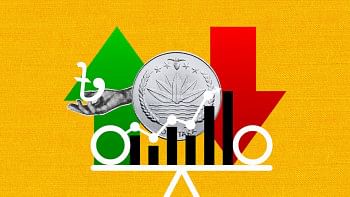The election that wasn't
2014 has ended on the very same note that it had started – with strike and violence. The beginning of 2014 saw the spillover of the violence of 2013 but only briefly, since the thunder that bellowed from the BNP leadership in December 2013 was full of sound and little else. In fact that the BNP failed to organise a substantive movement against the January 5 election or rally people to force the government to follow through its pre-election statement that the election was only to address the constitutional compulsion and that no sooner was the election held than the AL would start talk regarding the 11th Parliament. For those who did not believe the AL then stands vindicated for their position.
It was prudence perhaps which forced them to abstain from any further agitational programme. And that may have been construed by many as being an acceptance of a fait accompli – of a political situation stemming from a nearly voter less election on January 5, 2014. If it was a battle of attrition between the AL and BNP then it was AL that came out the better of the two with the people still smarting under the effect of the 2013 violence.
Not every country has the pleasure of being presented with an election at the very start of the year. And if it is like the one that we saw on January 5, the government determined to hammer it down our throat and the opposition resorting to extreme violence to see that did not happen, then it will remain indelible in our mind for long. Predictably the AL did not relent on the BNP demand for a caretaker government, and was perhaps not too unhappy to see the BNP boycott the elections.
It was clear that the shenanigans AL resorted to with Ershad and the JP to make them participate in the elections were only to lend the elections a modicum of plausibility and acceptability internationally. After all, there had to be an opposition in the parliament, Ershad needed one in 1988, and he managed a loyal opposition in the 4th Parliament. Sheikh Hasina in 2014 replicated an Ershad and managed a loyal opposition in the form of Ershad's JP, which some now term jocularly as Jatiyo Party (AL). Banter aside, the one regret that we have is to see regression of politics in the country to the extent that a political party with long traditions of struggle for democracy has to resort to the dubious politics of the military autocrats. However, if what we have today is an apology of parliamentary democracy then the responsibility must also be shared by the BNP who lacked the foresight to see through the AL ploy to keep it out of the parliamentary elections.
For the AL there was perhaps no other alternative, having successfully managed to keep the BNP from the election to stage-manage a poll, that would give it some degree of acceptability. The party was on legally valid ground but lacked a moral base. For the first time more than fifty percent of the Sangsad seats were uncontested and in the rest the voter turn out was abysmally low, although the Election Commission would want us to believe that forty percent voters turned out to chose their candidates on 5 Jan. That the 10th parliamentary elections had failed to meet the minimum criterion to qualify as an acceptable election is not a matter that needed to be proved; it was matter that has been accepted as a fact by most people, at home and abroad.
That the AL will not allow an inch to the BNP is very clear, and that was blatantly demonstrated on 28 December. The Gazipur episode was only the preview of things to come. Nevertheless, it seems that the more AL dismisses BNP as a political force the more it appears to be occupied with it.
However, what the AL seems to be overlooking is the fact that the demand for a pluralistic dispensation born out of an inclusive and participatory election is not the demand of the BNP alone. And engaging on the matter with the BNP - it being the only other party that matters - is not caving in to BNP demands, but showing respect for the legitimate expectation of a large segment of the voters.
It is only the imprudent and the statesman who will deliberately abridge the tenure of its stay in power, the latter for the sake of bringing in true democracy. What would the AL leaders want to be seen as?
The writer is Editor, Oped and Defence & Strategic Affairs, The Daily Star.

 For all latest news, follow The Daily Star's Google News channel.
For all latest news, follow The Daily Star's Google News channel. 



Comments